育儿知识-幼儿学英语 尊重孩子快乐为先
婴幼儿早教知识英语启蒙教育
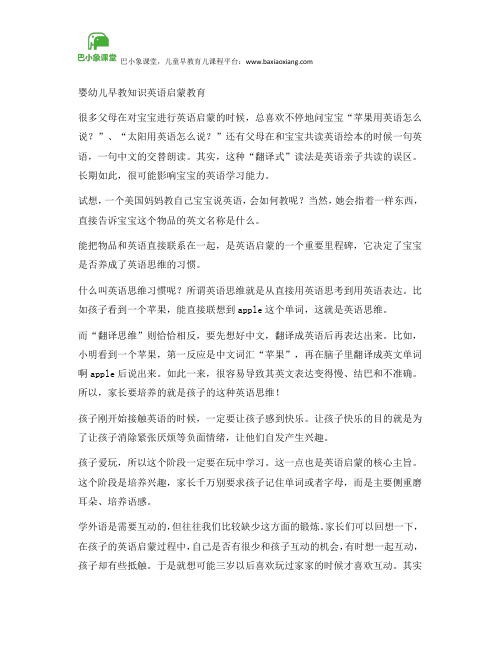
婴幼儿早教知识英语启蒙教育很多父母在对宝宝进行英语启蒙的时候,总喜欢不停地问宝宝“苹果用英语怎么说?”、“太阳用英语怎么说?”还有父母在和宝宝共读英语绘本的时候一句英语,一句中文的交替朗读。
其实,这种“翻译式”读法是英语亲子共读的误区。
长期如此,很可能影响宝宝的英语学习能力。
试想,一个美国妈妈教自己宝宝说英语,会如何教呢?当然,她会指着一样东西,直接告诉宝宝这个物品的英文名称是什么。
能把物品和英语直接联系在一起,是英语启蒙的一个重要里程碑,它决定了宝宝是否养成了英语思维的习惯。
什么叫英语思维习惯呢?所谓英语思维就是从直接用英语思考到用英语表达。
比如孩子看到一个苹果,能直接联想到apple这个单词,这就是英语思维。
而“翻译思维”则恰恰相反,要先想好中文,翻译成英语后再表达出来。
比如,小明看到一个苹果,第一反应是中文词汇“苹果”,再在脑子里翻译成英文单词啊apple后说出来。
如此一来,很容易导致其英文表达变得慢、结巴和不准确。
所以,家长要培养的就是孩子的这种英语思维!孩子刚开始接触英语的时候,一定要让孩子感到快乐。
让孩子快乐的目的就是为了让孩子消除紧张厌烦等负面情绪,让他们自发产生兴趣。
孩子爱玩,所以这个阶段一定要在玩中学习。
这一点也是英语启蒙的核心主旨。
这个阶段是培养兴趣,家长千万别要求孩子记住单词或者字母,而是主要侧重磨耳朵、培养语感。
学外语是需要互动的,但往往我们比较缺少这方面的锻炼。
家长们可以回想一下,在孩子的英语启蒙过程中,自己是否有很少和孩子互动的机会,有时想一起互动,孩子却有些抵触。
于是就想可能三岁以后喜欢玩过家家的时候才喜欢互动。
其实只要家长稍微花点心思,就可以引导孩子一起互动,即便是每次合作一两遍。
简单的短语句子,孩子们学的非常快,也很快就会跟读。
对于年龄相对来说小一点的宝宝或者英语启蒙初期的宝宝,听英文儿歌绝对是个非常不错的英语启蒙的好方法。
因为英文儿歌节奏感和韵律感强,歌词简短易懂,重得性高,好记好唱。
幼儿园大班英语启蒙教育:快乐学习ABC
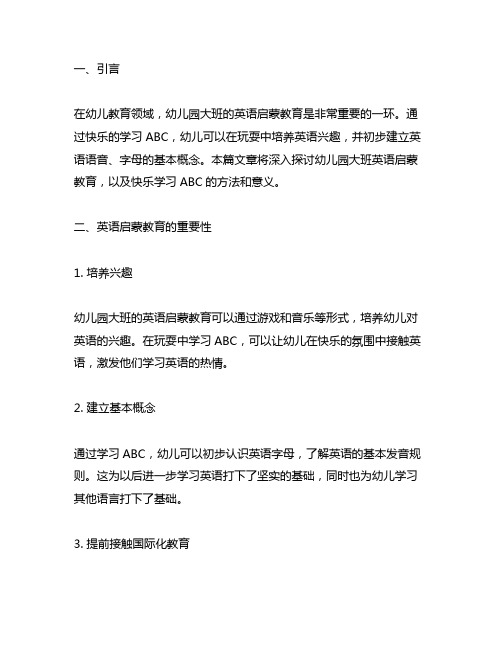
一、引言在幼儿教育领域,幼儿园大班的英语启蒙教育是非常重要的一环。
通过快乐的学习ABC,幼儿可以在玩耍中培养英语兴趣,并初步建立英语语音、字母的基本概念。
本篇文章将深入探讨幼儿园大班英语启蒙教育,以及快乐学习ABC的方法和意义。
二、英语启蒙教育的重要性1. 培养兴趣幼儿园大班的英语启蒙教育可以通过游戏和音乐等形式,培养幼儿对英语的兴趣。
在玩耍中学习ABC,可以让幼儿在快乐的氛围中接触英语,激发他们学习英语的热情。
2. 建立基本概念通过学习ABC,幼儿可以初步认识英语字母,了解英语的基本发音规则。
这为以后进一步学习英语打下了坚实的基础,同时也为幼儿学习其他语言打下了基础。
3. 提前接触国际化教育随着全球化的发展,英语已成为国际性的交流语言。
通过幼儿园大班的英语启蒙教育,可以让幼儿提前接触国际化教育,为他们未来的学习和生活打下坚实的基础。
三、快乐学习ABC的方法1. 游戏教学通过各种英语启蒙游戏,如英语歌曲、字母拼图等,让幼儿在愉快的氛围中学习ABC。
游戏教学不仅能够培养幼儿对英语的兴趣,还可以激发他们的学习动力。
2. 多感官体验利用视觉、听觉、触觉等多种感官,让幼儿在多种感官的刺激下学习ABC。
通过贴纸、卡通形象等视觉刺激,配合英语歌曲的听觉刺激,可以让幼儿更好地记忆和学习英语字母。
3. 家园合作幼儿园和家庭应该形成合作,共同为幼儿提供学习ABC的资源和环境。
家长可以通过在家里给幼儿播放英语歌曲、朗读英语绘本等方式,进一步巩固幼儿在幼儿园学到的知识。
四、快乐学习ABC的意义1. 培养自信心在幼儿园大班学习ABC,可以培养幼儿的自信心。
通过快乐的学习氛围,幼儿可以更加自信地表达自己的英语知识,为以后的学习打下自信的基础。
2. 培养学习兴趣在欢乐的活动中学习ABC,可以培养幼儿对英语学习的兴趣。
在玩耍中学习,不仅可以让幼儿更主动地参与学习,还可以让他们更深入地理解英语的魅力。
3. 促进综合发展通过快乐学习ABC,可以促进幼儿的综合素质发展。
幼儿学英语必备知识点总结

幼儿学英语必备知识点总结1. 字母字母是英语的基础,幼儿学习英语的第一步就是掌握字母。
幼儿可以通过听歌、看图书等方式学习字母,同时也要进行书写训练,如跟着老师一起写字母、完成字母拼图等活动。
在学习字母的过程中,幼儿还可以通过字母卡片、字母拼图等教具进行辅助学习,帮助他们更好地记忆字母的形状和发音。
2. 单词幼儿学习英语的第二步是掌握一些简单的单词,如动物、水果、颜色、数字等。
幼儿可以通过听故事、玩游戏等方式学习单词,同时也要进行口语训练,如师生问答、角色扮演等活动。
在学习单词的过程中,幼儿还可以通过图片、视频等媒体进行辅助学习,帮助他们更好地理解和记忆单词的含义和发音。
3. 句型幼儿学习英语的第三步是掌握一些简单的句型,如主谓宾句、疑问句、祈使句等。
幼儿可以通过听对话、模仿朗读等方式学习句型,同时也要进行语法训练,如填空练习、造句练习等活动。
在学习句型的过程中,幼儿还可以通过游戏、剧本等活动进行辅助学习,帮助他们更好地掌握句型的结构和用法。
4. 语法幼儿学习英语的第四步是掌握一些简单的语法知识,如时态、语态、语气等。
幼儿可以通过听故事、看视频等方式学习语法知识,同时也要进行写作训练,如完成练习册、撰写小作文等活动。
在学习语法知识的过程中,幼儿还可以通过课堂讲解、互动讨论等活动进行辅助学习,帮助他们更好地掌握语法知识的规则和用法。
5. 语音幼儿学习英语的最后一步是掌握一些标准的语音,如元音、辅音、连读等。
幼儿可以通过听音乐、跟唱歌曲等方式学习语音,同时也要进行发音训练,如练习音标、模仿口型等活动。
在学习语音的过程中,幼儿还可以通过口语训练、朗读练习等活动进行辅助学习,帮助他们更好地掌握语音的发音和语调。
总之,幼儿学习英语需要有计划地学习字母、单词、句型、语法和语音,同时要进行多种形式的综合训练,如听、说、读、写、唱、跳等。
此外,家长和老师要给予幼儿足够的关注和指导,引导他们从生活中、游戏中融入英语学习,培养他们的学习兴趣和自主学习能力。
幼儿英语启蒙父母要牢记的10句金言
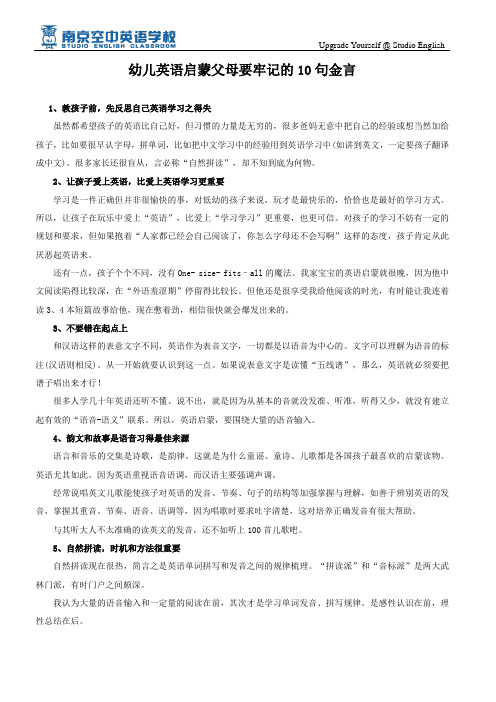
幼儿英语启蒙父母要牢记的10句金言1、教孩子前,先反思自己英语学习之得失虽然都希望孩子的英语比自己好,但习惯的力量是无穷的,很多爸妈无意中把自己的经验或想当然加给孩子,比如要很早认字母,拼单词,比如把中文学习中的经验用到英语学习中(如讲到英文,一定要孩子翻译成中文)。
很多家长还很盲从,言必称“自然拼读”,却不知到底为何物。
2、让孩子爱上英语,比爱上英语学习更重要学习是一件正确但并非很愉快的事,对低幼的孩子来说,玩才是最快乐的,恰恰也是最好的学习方式。
所以,让孩子在玩乐中爱上“英语”,比爱上“学习学习”更重要,也更可信。
对孩子的学习不妨有一定的规划和要求,但如果抱着“人家都已经会自己阅读了,你怎么字母还不会写啊”这样的态度,孩子肯定从此厌恶起英语来。
还有一点,孩子个个不同,没有One- size- fits–all的魔法。
我家宝宝的英语启蒙就很晚,因为他中文阅读陷得比较深,在“外语羞涩期”停留得比较长。
但他还是很享受我给他阅读的时光,有时能让我连着读3、4本短篇故事给他,现在憋着劲,相信很快就会爆发出来的。
3、不要错在起点上和汉语这样的表意文字不同,英语作为表音文字,一切都是以语音为中心的。
文字可以理解为语音的标注(汉语则相反)。
从一开始就要认识到这一点。
如果说表意文字是读懂“五线谱”,那么,英语就必须要把谱子唱出来才行!很多人学几十年英语还听不懂、说不出,就是因为从基本的音就没发准、听准,听得又少,就没有建立起有效的“语音-语义”联系。
所以,英语启蒙,要围绕大量的语音输入。
4、韵文和故事是语音习得最佳来源语言和音乐的交集是诗歌,是韵律。
这就是为什么童谣、童诗、儿歌都是各国孩子最喜欢的启蒙读物。
英语尤其如此。
因为英语重视语音语调,而汉语主要强调声调。
经常说唱英文儿歌能使孩子对英语的发音、节奏、句子的结构等加强掌握与理解,如善于辨别英语的发音,掌握其重音、节奏、语音、语调等,因为唱歌时要求吐字清楚,这对培养正确发音有很大帮助。
幼儿教育中的英语启蒙指导原则

幼儿教育中的英语启蒙指导原则在当今全球化的社会中,英语作为一门国际通用语言,对于幼儿的教育和成长起着重要的作用。
英语启蒙教育旨在培养幼儿的语言能力、跨文化交流能力和认知能力。
本文将探讨幼儿教育中的英语启蒙指导原则,从语言环境、游戏化教学和情感互动三个方面进行论述。
首先,创造良好的语言环境是英语启蒙教育的基础。
在幼儿园和家庭中,可以通过布置英语角、播放英语儿歌和故事等方式,营造英语学习的氛围。
在这个环境中,教师和家长可以用简单的英语词汇与幼儿进行日常交流,例如问候、询问感受等。
通过频繁接触英语,幼儿能够建立起对英语的兴趣和好奇心,从而激发他们学习英语的动机。
其次,游戏化教学是幼儿英语启蒙教育的重要手段。
幼儿喜欢玩耍,通过游戏能够激发他们的学习兴趣和积极性。
教师可以设计一些趣味性的英语游戏,如角色扮演、拼图游戏和歌曲演唱等,让幼儿在游戏中感受到学习英语的乐趣。
同时,游戏还可以培养幼儿的合作意识和团队精神,通过与同伴的互动,他们能够在轻松的氛围中自然而然地掌握英语表达能力。
最后,情感互动是幼儿英语启蒙教育中不可或缺的因素。
幼儿是情感活跃的群体,他们对于教师和家长的情感关系非常敏感。
在英语启蒙教育中,教师和家长应该与幼儿建立起良好的情感连接,让他们感受到温暖和关爱。
教师可以通过表扬、鼓励和亲切的语言,激发幼儿学习英语的积极性。
同时,家长也应该积极参与到幼儿的英语学习中,与他们共同探索英语的乐趣,增进亲子关系。
总之,幼儿教育中的英语启蒙指导原则包括创造良好的语言环境、游戏化教学和情感互动。
通过这些指导原则,幼儿能够在轻松、愉快的学习氛围中逐渐掌握英语表达能力,培养跨文化交流能力和认知能力。
教师和家长在幼儿英语启蒙教育中扮演着重要的角色,他们应该积极引导幼儿,激发他们学习英语的兴趣和动机,为他们的未来发展奠定坚实的基础。
英语培训:宝宝学英语快乐最重要

孩子早点学英语是好的,但是不能让孩子感觉到学英语是一种负担,要让孩子快乐进行英语学习,发现英语乐趣,养成自觉学习英语的好习惯。
孩子的天性是快乐的,他们很自然表达自己的喜恶,对于喜欢的东西,会主动去接触,而讨厌的事物,也会非常抵触,所以让孩子对英语产生兴趣最关键。
据目前中国的幼儿英语教育情况来看,大多数孩子都表示不喜欢学英语,其问题在于家长和一些英语培训机构的教学方式忽略了孩子的天性,增加了孩子学习压力。
家长是孩子学英语的启蒙老师,要时刻关注孩子的情绪,学会引导孩子学习,熟悉孩子的脾性,让孩子在英语的环境中,轻松愉悦学习英语,比如通过玩游戏、唱歌、画画等孩子喜好的形式来潜移默化地学英语才是最好的方法。
也可以给孩子请个热情开朗的幼儿英语外教,请到家里给孩子上课,渐渐地,外教就会成为孩子的大朋友,每次上课就是一个孩子与朋友玩乐的过程,时间已久,地道英语脱口而出,这样的英语课,孩子想不喜欢都难。
英语培训机构应该根据孩子的年龄细致分层,设置不同英语课程,汉普森英语的少儿英语课程就进行了细致的年龄分层:0~3岁;3~6岁;6~9岁;9~12岁;12~18岁。
每个年龄阶段都由汉普森教研部门和具有丰富教学经验的外教老师潜心研究的教学方法。
根据各个年龄段小朋友的特色制定,比如针对0-3岁幼儿,主要是以鼓励和引导为主,培养幼儿英语学习的兴趣,通过触摸、游戏、讲故事等方式,帮助宝宝认识事物并快速吸收知识,同时帮助宝宝习惯英语的发音、语调等,培养听力的敏感度;针对6-12岁儿童,汉普森英语则研发了口语交流课程,运用各种孩子感兴趣的话题,激发孩子大胆开口说英语,培养孩子流利、自然、自信的英语表达能力。
最后,汉普森英语提醒家长:宝宝学英语快乐最重要,家长不应该让孩子过早进入焦虑状态,让孩子尽情享受童年乐趣,快乐学习最关键。
尊重孩子的英文作文
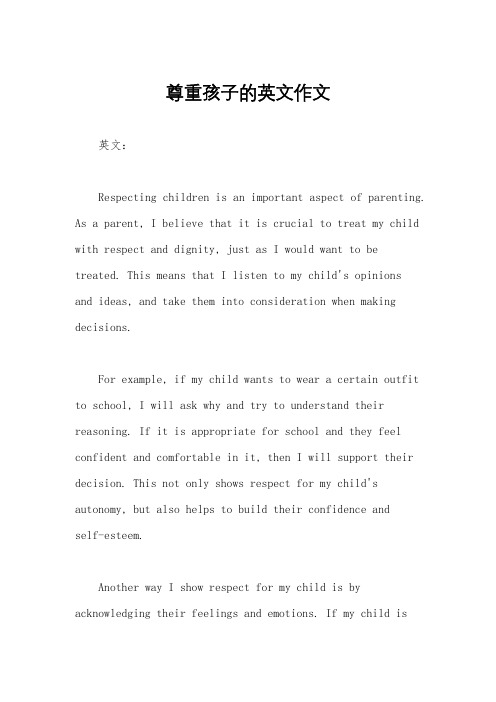
尊重孩子的英文作文英文:Respecting children is an important aspect of parenting. As a parent, I believe that it is crucial to treat my child with respect and dignity, just as I would want to be treated. This means that I listen to my child's opinionsand ideas, and take them into consideration when making decisions.For example, if my child wants to wear a certain outfit to school, I will ask why and try to understand their reasoning. If it is appropriate for school and they feel confident and comfortable in it, then I will support their decision. This not only shows respect for my child's autonomy, but also helps to build their confidence andself-esteem.Another way I show respect for my child is by acknowledging their feelings and emotions. If my child isupset or angry, I will listen to them and try to understand why they feel that way. I will not dismiss their feelingsor tell them to "just get over it." Instead, I willvalidate their emotions and help them find ways to cope and problem-solve.中文:尊重孩子是育儿中的重要方面。
尊重孩子的兴趣的英语作文
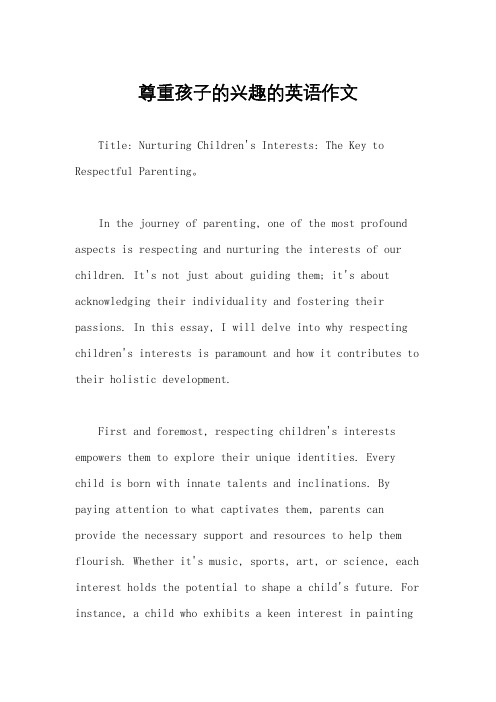
尊重孩子的兴趣的英语作文Title: Nurturing Children's Interests: The Key to Respectful Parenting。
In the journey of parenting, one of the most profound aspects is respecting and nurturing the interests of our children. It's not just about guiding them; it's about acknowledging their individuality and fostering their passions. In this essay, I will delve into why respecting children's interests is paramount and how it contributes to their holistic development.First and foremost, respecting children's interests empowers them to explore their unique identities. Every child is born with innate talents and inclinations. By paying attention to what captivates them, parents can provide the necessary support and resources to help them flourish. Whether it's music, sports, art, or science, each interest holds the potential to shape a child's future. For instance, a child who exhibits a keen interest in paintingmight later become a renowned artist, but only if their passion is nurtured and respected from a young age.Moreover, honoring children's interests fosters a sense of autonomy and self-confidence. When parents validatetheir children's choices and actively engage with their interests, it sends a powerful message that their opinions matter. This validation boosts their self-esteem and encourages them to pursue their passions fearlessly. Instead of conforming to societal expectations or parental pressures, they learn to trust their instincts and follow their hearts. As a result, they grow into individuals who are assertive, resilient, and unafraid to carve their own paths in life.Furthermore, respecting children's interests promotes a deeper parent-child bond. When parents take a genuine interest in their children's hobbies and activities, it strengthens the emotional connection between them. Shared experiences, whether it's attending a soccer game, visiting a museum, or playing a musical instrument together, create lasting memories and deepen mutual understanding. This bondlays the foundation for open communication and trust, enabling children to confide in their parents without fear of judgment. As a result, parents become not just authority figures but also trusted allies in their children's journey of self-discovery.Additionally, nurturing children's interests cultivates essential life skills such as discipline, perseverance, and creativity. When children are passionate about something, they willingly invest time and effort to hone their skills and overcome challenges. Whether it's practicing piano scales for hours, perfecting a soccer technique, or conducting science experiments in the backyard, they learn the value of hard work and determination. Moreover, exploring different interests exposes children to diverse perspectives and fosters creativity by encouraging them to think outside the box.In conclusion, respecting children's interests is not just a parenting philosophy; it's a fundamental aspect of nurturing healthy, confident, and well-rounded individuals. By acknowledging and supporting their passions, parents laythe groundwork for their children's future success and happiness. As we embark on this journey of parenthood, let us remember that our role is not to mold our children into replicas of ourselves but to empower them to become the best versions of themselves. And it all begins with a simple act of respect for their interests and aspirations.。
父母如何尊重孩子英语作文
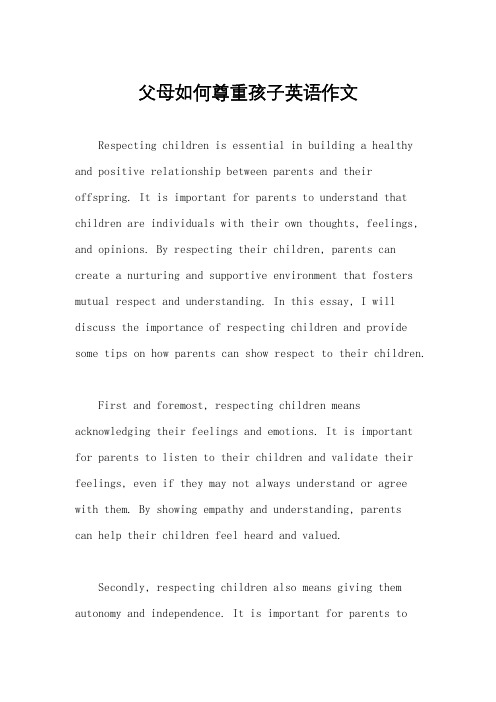
父母如何尊重孩子英语作文Respecting children is essential in building a healthy and positive relationship between parents and their offspring. It is important for parents to understand that children are individuals with their own thoughts, feelings, and opinions. By respecting their children, parents can create a nurturing and supportive environment that fosters mutual respect and understanding. In this essay, I will discuss the importance of respecting children and provide some tips on how parents can show respect to their children.First and foremost, respecting children means acknowledging their feelings and emotions. It is important for parents to listen to their children and validate their feelings, even if they may not always understand or agree with them. By showing empathy and understanding, parentscan help their children feel heard and valued.Secondly, respecting children also means giving them autonomy and independence. It is important for parents totrust their children and allow them to make their own decisions, within reason. By giving children the freedom to explore and learn from their mistakes, parents can empower them to become confident and independent individuals.Furthermore, respecting children involves treating them with kindness and compassion. It is important for parents to communicate with their children in a respectful and gentle manner, even when addressing discipline or conflict. By using positive reinforcement and constructive feedback, parents can help their children learn and grow in a supportive environment.In addition, respecting children also means setting boundaries and expectations. It is important for parents to establish clear rules and consequences, while also being flexible and understanding of their children's needs. By providing structure and guidance, parents can help their children develop a sense of responsibility and accountability.In conclusion, respecting children is crucial inbuilding a strong and healthy relationship between parents and their offspring. By acknowledging their feelings, giving them autonomy, treating them with kindness, and setting boundaries, parents can create a nurturing and supportive environment that fosters mutual respect and understanding. Ultimately, by showing respect to their children, parents can help them grow into confident, independent, and compassionate individuals.。
尊重孩子的作文英语
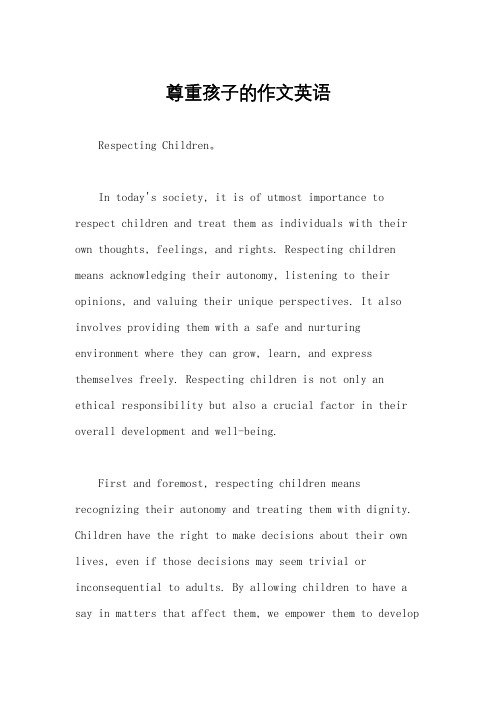
尊重孩子的作文英语Respecting Children。
In today's society, it is of utmost importance to respect children and treat them as individuals with their own thoughts, feelings, and rights. Respecting children means acknowledging their autonomy, listening to their opinions, and valuing their unique perspectives. It also involves providing them with a safe and nurturing environment where they can grow, learn, and express themselves freely. Respecting children is not only an ethical responsibility but also a crucial factor in their overall development and well-being.First and foremost, respecting children means recognizing their autonomy and treating them with dignity. Children have the right to make decisions about their own lives, even if those decisions may seem trivial or inconsequential to adults. By allowing children to have a say in matters that affect them, we empower them to developa sense of self-worth and independence. For instance, instead of dictating what clothes they should wear or what activities they should engage in, we can involve childrenin the decision-making process and respect their choices.Moreover, listening to children and valuing their opinions is an essential aspect of respecting them.Children have valuable insights and ideas that should be heard and taken into consideration. When adults actively listen to children, it not only boosts their self-confidence but also fosters open and honest communication. By creating an environment where children feel safe to express their thoughts and feelings, we show them thattheir opinions are valued and respected. This encourages them to develop critical thinking skills and the ability to articulate their ideas effectively.Furthermore, respecting children means providing them with a safe and nurturing environment where they can thrive. This includes ensuring their physical and emotional well-being. Parents, caregivers, and educators should create spaces that are free from violence, abuse, and neglect.Children should feel secure and protected, knowing that their rights and boundaries are respected. Additionally, it is crucial to provide them with opportunities for learning, growth, and development. This can be achieved through age-appropriate activities, access to education, and exposure to diverse experiences.Respecting children also means acknowledging their unique perspectives and individuality. Each child is different, with their own strengths, weaknesses, and interests. It is important to celebrate and appreciate these differences rather than trying to mold children into a predetermined mold. By recognizing and supporting their individuality, we allow children to develop a strong sense of self and pursue their passions and talents. This fosters a positive self-image and encourages them to explore their full potential.In conclusion, respecting children is a fundamental aspect of creating a harmonious and nurturing society. By acknowledging their autonomy, listening to their opinions, providing a safe environment, and valuing their uniqueperspectives, we empower children to become confident, independent, and compassionate individuals. Respecting children is not only a moral obligation but also a crucial investment in their well-being and future. Let us strive to create a world where every child is respected, valued, and given the opportunity to thrive.。
尊重你的孩子英语作文
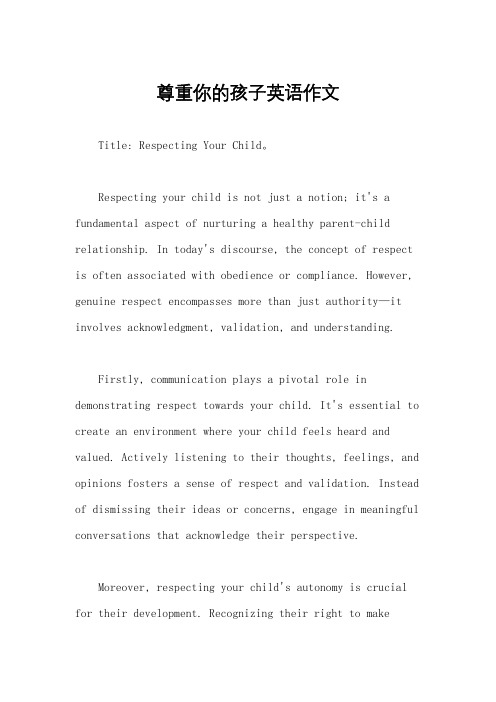
尊重你的孩子英语作文Title: Respecting Your Child。
Respecting your child is not just a notion; it's a fundamental aspect of nurturing a healthy parent-child relationship. In today's discourse, the concept of respect is often associated with obedience or compliance. However, genuine respect encompasses more than just authority—it involves acknowledgment, validation, and understanding.Firstly, communication plays a pivotal role in demonstrating respect towards your child. It's essential to create an environment where your child feels heard and valued. Actively listening to their thoughts, feelings, and opinions fosters a sense of respect and validation. Instead of dismissing their ideas or concerns, engage in meaningful conversations that acknowledge their perspective.Moreover, respecting your child's autonomy is crucial for their development. Recognizing their right to makechoices and decisions empowers them and fosters independence. Offering guidance and support while allowing them to explore their interests and preferences instills confidence and self-esteem. By respecting their autonomy, you cultivate a sense of trust and mutual understanding within the parent-child dynamic.Furthermore, it's vital to acknowledge and validateyour child's emotions. Emotions are an integral part of the human experience, and children need validation and supportin navigating their feelings. Instead of invalidating or dismissing their emotions, empathize with their experiences and provide a safe space for expression. Teaching them healthy coping mechanisms and problem-solving skills equips them to manage their emotions effectively.Additionally, setting boundaries with respect is essential for fostering a healthy parent-child relationship. Boundaries provide structure and guidance while also demonstrating respect for each other's needs andlimitations. Clearly communicating expectations and consequences helps establish mutual respect andunderstanding. It's essential to enforce boundaries consistently while also being flexible and adaptable toyour child's changing needs.Moreover, leading by example is paramount in teaching respect. Children learn by observing their parents' behavior, attitudes, and interactions. Modeling respectful communication, empathy, and kindness in your interactions with others sets a positive example for your child to emulate. By demonstrating respect in your actions and words, you cultivate a culture of mutual respect and understanding within your family.Furthermore, celebrating your child's achievements and milestones is an expression of respect and affirmation. Acknowledging their efforts and successes instills confidence and motivates them to pursue their goals. Whether it's academic achievements, creative endeavors, or personal growth, taking pride in your child's accomplishments reinforces their sense of worth and value.In conclusion, respecting your child is not just amoral imperative; it's a cornerstone of building a strong and nurturing parent-child relationship. Through open communication, autonomy, validation of emotions, setting boundaries, leading by example, and celebrating achievements, you demonstrate respect in various facets of your child's life. By prioritizing respect in your interactions and fostering a culture of mutual respect within your family, you lay the foundation for a lifelong bond built on understanding, trust, and love.。
尊重孩子的英语作文初一
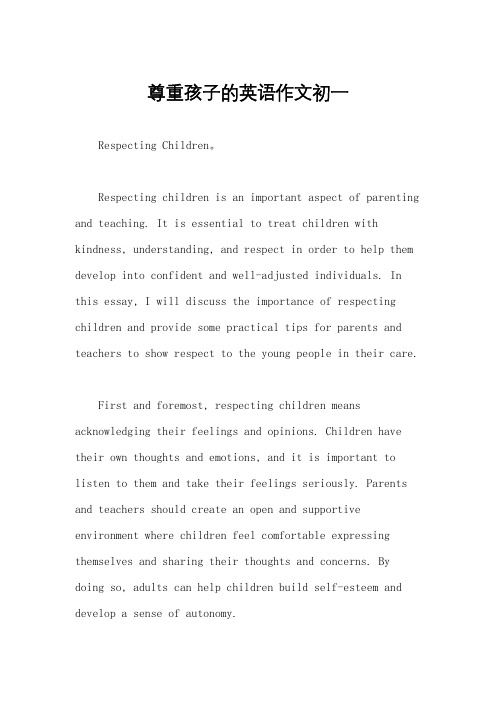
尊重孩子的英语作文初一Respecting Children。
Respecting children is an important aspect of parenting and teaching. It is essential to treat children with kindness, understanding, and respect in order to help them develop into confident and well-adjusted individuals. In this essay, I will discuss the importance of respecting children and provide some practical tips for parents and teachers to show respect to the young people in their care.First and foremost, respecting children means acknowledging their feelings and opinions. Children have their own thoughts and emotions, and it is important to listen to them and take their feelings seriously. Parents and teachers should create an open and supportive environment where children feel comfortable expressing themselves and sharing their thoughts and concerns. By doing so, adults can help children build self-esteem and develop a sense of autonomy.Furthermore, respecting children involves treating them with kindness and empathy. It is important to remember that children are still learning and growing, and they will make mistakes along the way. Instead of being harsh or critical, adults should offer guidance and support, and help children learn from their experiences. By showing understanding and compassion, adults can help children develop a positiveself-image and a healthy attitude towards learning and growth.In addition, respecting children means valuing their individuality and uniqueness. Every child is different, with their own strengths, weaknesses, and interests. Parents and teachers should take the time to get to know each child as an individual, and support them in pursuing their passions and talents. By doing so, adults can help children develop a strong sense of self-worth and confidence in their abilities.Finally, respecting children involves setting clear and reasonable boundaries. While it is important to givechildren freedom to explore and express themselves, it is also important to provide structure and guidance. Parents and teachers should establish clear rules and expectations, and enforce them in a fair and consistent manner. By doing so, adults can help children learn to respect others and take responsibility for their actions.In conclusion, respecting children is a crucial aspectof parenting and teaching. By acknowledging children's feelings and opinions, treating them with kindness and empathy, valuing their individuality, and setting clear boundaries, adults can help children develop into confident, well-adjusted individuals. It is important for parents and teachers to remember that respecting children is not just about being polite and courteous, but about creating an environment where children feel valued, supported, and empowered to reach their full potential.。
父母与孩子之间应该互相尊重英语作文
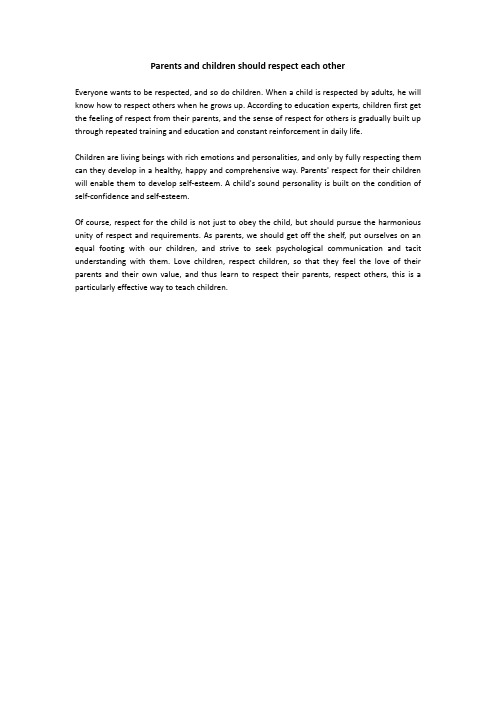
Parents and children should respect each otherEveryone wants to be respected, and so do children. When a child is respected by adults, he will know how to respect others when he grows up. According to education experts, children first get the feeling of respect from their parents, and the sense of respect for others is gradually built up through repeated training and education and constant reinforcement in daily life.Children are living beings with rich emotions and personalities, and only by fully respecting them can they develop in a healthy, happy and comprehensive way. Parents' respect for their children will enable them to develop self-esteem. A child's sound personality is built on the condition of self-confidence and self-esteem.Of course, respect for the child is not just to obey the child, but should pursue the harmonious unity of respect and requirements. As parents, we should get off the shelf, put ourselves on an equal footing with our children, and strive to seek psychological communication and tacit understanding with them. Love children, respect children, so that they feel the love of their parents and their own value, and thus learn to respect their parents, respect others, this is a particularly effective way to teach children.。
尊重孩子的作文英语初一
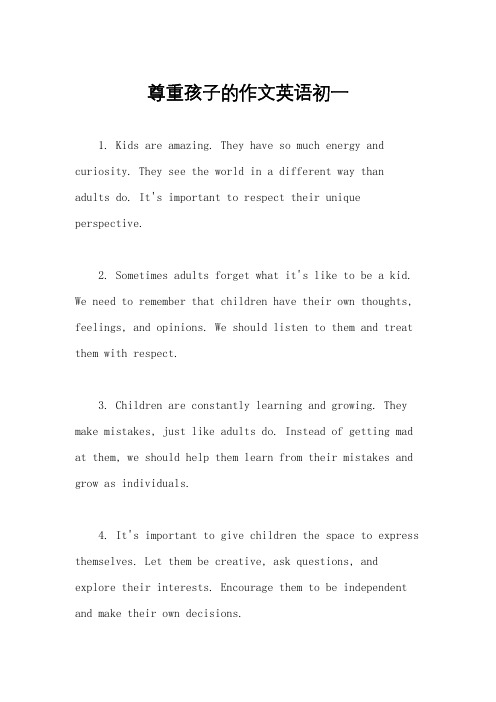
尊重孩子的作文英语初一1. Kids are amazing. They have so much energy and curiosity. They see the world in a different way than adults do. It's important to respect their unique perspective.2. Sometimes adults forget what it's like to be a kid. We need to remember that children have their own thoughts, feelings, and opinions. We should listen to them and treat them with respect.3. Children are constantly learning and growing. They make mistakes, just like adults do. Instead of getting mad at them, we should help them learn from their mistakes and grow as individuals.4. It's important to give children the space to express themselves. Let them be creative, ask questions, and explore their interests. Encourage them to be independent and make their own decisions.5. Kids may be small, but they have big emotions. It's important to validate their feelings and help them navigate through their emotions. By showing empathy and understanding, we can build a strong connection with children.6. Respecting children means treating them as equals. We should not talk down to them or belittle their thoughts and ideas. Instead, we should empower them to speak up and be confident in themselves.7. Children are the future. By respecting and supporting them, we are investing in a brighter tomorrow. Let's create a world where kids feel valued, heard, and respected.。
育儿知识-幼儿学习英语必须注意两个细节

幼儿学习英语必须注意两个细节孩子毕竟身体各方面素质都处于人生中四肢最幼嫩的第三阶段,读书学习英语没有积极性是很平常的。
但是家长不能因此不能就觉得孩子没有学习英语的潜质。
而要耐心的努力他们,设身处地的为他们排忧解难,对孩子学习英语是有很大效用的。
学习英语中最关键的就是为孩子舍去一本适合的用书教材,能够引起孩子的注意力。
其中就包括有古书很多有图的书,或者是一些少儿节目、报纸等。
要根据孩子的认知程度去挑选教材。
不能走极端,简单的会让孩子没有动力,扁角龙的又会让孩子失去自信。
在生活中注意观察孩子的爱好,就可以选择他喜欢的生活的主题的社交生活教材。
如果比较喜欢花草就可以买图有花草的书,喜欢动物就买到有其中画有动物的书籍。
以此类推,让孩子将生活与中文结合在一起。
其次仍要选好玩的教材,就必须具有的特点是可以让他自由的操作、毫无任何压力的、有趣的,而且记住不必一直把学习当作前提,只要孩子觉得好玩就可以学习,没有兴趣当然不想接触。
为孩子购买的学习英语书的数量好少而精,最重要的就是符合孩子父母的热忱,慢慢的孩子的英语程度就会小孩子提高。
如果是有音乐的教学内容,就要选择单纯的,不要太复杂的节奏,CD的背景画面也切勿太花,这样会抢走了原本要让孩子听见或看的重点。
为孩子们创造一种幽默诙谐轻松欢快的教学氛围,让他们感到就和学母语一样简单。
选择什么样的方法,要以幼儿身心发展规律为依据幼儿学英语时转型并不要求他们会写,只要辨认出单词会读就好,因为他们手部肌肉发育还尚未发育成熟。
处在幼儿时期,儿童们的注意力是很分散的,这时就需要老师用合理的方法吸引幼儿们的注意力。
可以将学习英语转换成格斗游戏的形式,让幼儿融入其中,进而启发他们的学习兴趣。
总结:幼儿在幼儿英语学习中是不能缺少的角色,要将幼儿引导到学习英语的正轨上。
并为英语词汇他们挑选最是和幼儿学习的英语书籍。
虽然有众多的英语书籍种类,家长要站在幼儿的角度思考问题,购买的必需须要是他们所喜欢的,因为幼儿对于学习这个过程整个过程还奇怪,是不会用一种认真的态度严肃去面对的。
幼儿园英语学习的家长指南
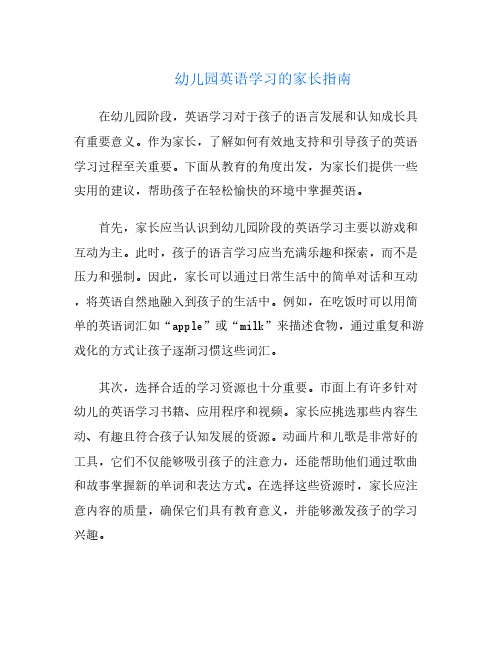
幼儿园英语学习的家长指南在幼儿园阶段,英语学习对于孩子的语言发展和认知成长具有重要意义。
作为家长,了解如何有效地支持和引导孩子的英语学习过程至关重要。
下面从教育的角度出发,为家长们提供一些实用的建议,帮助孩子在轻松愉快的环境中掌握英语。
首先,家长应当认识到幼儿园阶段的英语学习主要以游戏和互动为主。
此时,孩子的语言学习应当充满乐趣和探索,而不是压力和强制。
因此,家长可以通过日常生活中的简单对话和互动,将英语自然地融入到孩子的生活中。
例如,在吃饭时可以用简单的英语词汇如“apple”或“milk”来描述食物,通过重复和游戏化的方式让孩子逐渐习惯这些词汇。
其次,选择合适的学习资源也十分重要。
市面上有许多针对幼儿的英语学习书籍、应用程序和视频。
家长应挑选那些内容生动、有趣且符合孩子认知发展的资源。
动画片和儿歌是非常好的工具,它们不仅能够吸引孩子的注意力,还能帮助他们通过歌曲和故事掌握新的单词和表达方式。
在选择这些资源时,家长应注意内容的质量,确保它们具有教育意义,并能够激发孩子的学习兴趣。
为了让孩子更好地理解和使用英语,家长可以通过创设英语环境来增强语言学习的效果。
例如,可以在家中设置一个“英语角”,每天固定时间播放英语故事或进行英语游戏。
这样的环境能让孩子在非正式的场合中自然而然地接触和使用英语,增加他们的语言输入量。
另外,与孩子的互动也是提高英语能力的关键。
家长应鼓励孩子用英语进行简单的对话,即使是短句或单词,也能帮助他们逐步建立语言的信心。
家长可以与孩子一起进行角色扮演游戏,通过模拟各种情境让孩子运用所学的英语。
这种互动不仅能提高孩子的语言能力,还能增进亲子关系。
此外,家长应当给予孩子充分的鼓励和肯定。
学习语言的过程可能会有挫折和困难,但这些都是成长的一部分。
通过正面的反馈和鼓励,家长可以帮助孩子建立自信,让他们在遇到挑战时保持积极的学习态度。
要记住,学习英语的目的是让孩子能够在愉快的环境中自然地使用语言,而不是仅仅为了应付考试或完成任务。
幼儿英语安全教育讲解
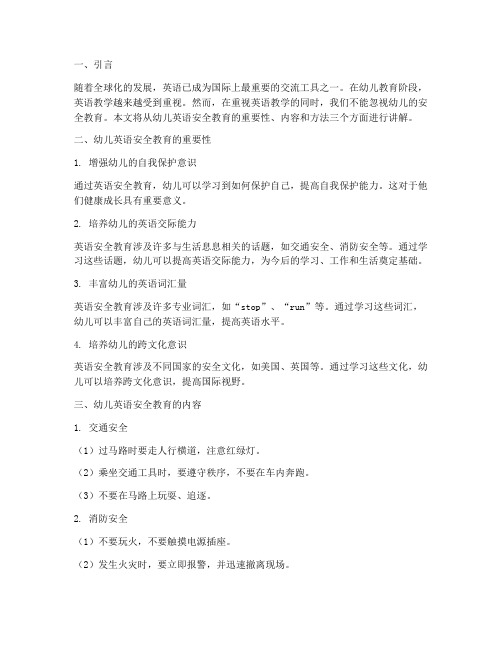
一、引言随着全球化的发展,英语已成为国际上最重要的交流工具之一。
在幼儿教育阶段,英语教学越来越受到重视。
然而,在重视英语教学的同时,我们不能忽视幼儿的安全教育。
本文将从幼儿英语安全教育的重要性、内容和方法三个方面进行讲解。
二、幼儿英语安全教育的重要性1. 增强幼儿的自我保护意识通过英语安全教育,幼儿可以学习到如何保护自己,提高自我保护能力。
这对于他们健康成长具有重要意义。
2. 培养幼儿的英语交际能力英语安全教育涉及许多与生活息息相关的话题,如交通安全、消防安全等。
通过学习这些话题,幼儿可以提高英语交际能力,为今后的学习、工作和生活奠定基础。
3. 丰富幼儿的英语词汇量英语安全教育涉及许多专业词汇,如“stop”、“run”等。
通过学习这些词汇,幼儿可以丰富自己的英语词汇量,提高英语水平。
4. 培养幼儿的跨文化意识英语安全教育涉及不同国家的安全文化,如美国、英国等。
通过学习这些文化,幼儿可以培养跨文化意识,提高国际视野。
三、幼儿英语安全教育的内容1. 交通安全(1)过马路时要走人行横道,注意红绿灯。
(2)乘坐交通工具时,要遵守秩序,不要在车内奔跑。
(3)不要在马路上玩耍、追逐。
2. 消防安全(1)不要玩火,不要触摸电源插座。
(2)发生火灾时,要立即报警,并迅速撤离现场。
(3)掌握灭火器的使用方法。
3. 防拐骗(1)不要轻信陌生人的话,不要跟陌生人走。
(2)记住家长的姓名、电话号码。
(3)遇到危险时,要大声呼救。
4. 防疫安全(1)勤洗手,保持个人卫生。
(2)戴口罩,防止病毒传播。
(3)不要触摸眼睛、鼻子和嘴巴。
四、幼儿英语安全教育的方法1. 创设情境教学通过创设与幼儿生活息息相关的情境,让他们在轻松愉快的氛围中学习英语安全知识。
例如,教师可以模拟过马路、乘车等场景,让幼儿在实践中掌握安全知识。
2. 利用多媒体教学利用多媒体教学手段,如图片、视频、音频等,使幼儿在直观、生动的学习中掌握英语安全知识。
3. 开展游戏教学通过游戏教学,激发幼儿学习英语安全知识的兴趣。
幼儿园家长关注幼儿园英语教育

幼儿园家长关注幼儿园英语教育引言随着全球化的深入发展,英语作为国际通用语言的地位日益重要。
越来越多的家长意识到幼儿期是儿童接触英语的重要阶段,对于幼儿园的英语教育也开始关注。
本文将从幼儿园英语教育的重要性、如何选择好的幼儿园英语教育、家长如何参与等方面进行详细阐述。
幼儿园英语教育的重要性幼儿期是儿童语言发展的关键时期,此时的儿童具有极强的语言学习能力。
因此,从幼儿园开始接受英语教育,能够帮助儿童打下良好的英语基础。
以下是幼儿园英语教育的重要性:1.提前接触英语:通过早期接触英语,儿童能够对英语的发音、语调等有早期敏感期的感受,可以更轻松地掌握英语语音。
2.拓展语言能力:英语教育能够帮助儿童发展语言能力,增强词汇量和句子构建能力,提高口语表达能力。
3.增强跨文化意识:通过英语教育,儿童能够了解其他文化,增强跨文化交流的意识和能力,有助于儿童在全球化的环境中更好地适应。
4.提高学习兴趣:通过幼儿园的英语教育,儿童可以培养对学习英语的兴趣,激发学习的积极性。
如何选择好的幼儿园英语教育家长在选择幼儿园英语教育时,需要考虑以下几个方面来做出明智的选择:1.教育理念和目标:了解幼儿园的教育理念和目标,确保与家庭教育观念相契合。
注重儿童个体发展,注重兴趣培养和全面能力发展的幼儿园是更好的选择。
2.师资力量:关注幼儿园的教师队伍,了解教师的专业背景、英语水平和教学经验等。
优秀的教师能够给予儿童更好的英语学习环境和指导。
3.教学资源和设施:幼儿园是否拥有与英语教育相关的教学资源和设施,如英语绘本、英语角、多媒体教学设备等。
这些资源能够增强儿童接触英语的机会和学习体验。
4.课程设置:了解幼儿园的英语课程设置,是否针对不同年龄段的儿童进行分层次教学。
确保课程内容丰富多样,注重听说读写全面发展。
5.家庭参与机会:关注幼儿园是否鼓励家长参与英语教育。
家长与学校的合作能够更好地促进儿童的英语学习。
家长如何参与英语教育家长在幼儿园英语教育中的参与是非常重要的,可以有效提高儿童的学习成效。
育儿知识-快来学!孩子英文启蒙这么教
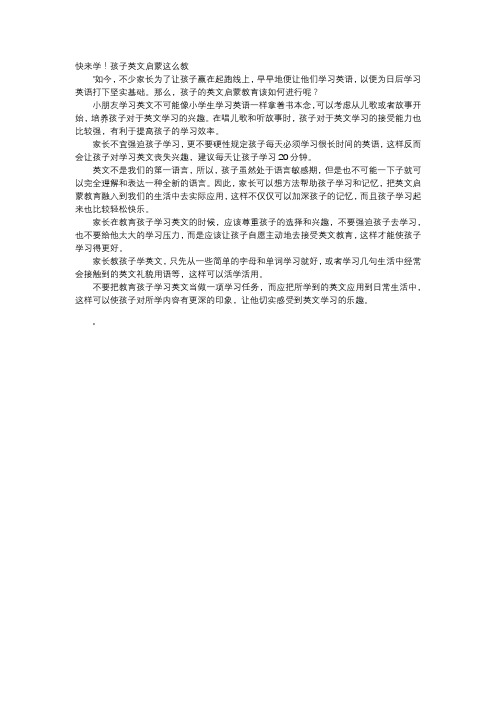
快来学!孩子英文启蒙这么教
'如今,不少家长为了让孩子赢在起跑线上,早早地便让他们学习英语,以便为日后学习英语打下坚实基础。
那么,孩子的英文启蒙教育该如何进行呢?
小朋友学习英文不可能像小学生学习英语一样拿着书本念,可以考虑从儿歌或者故事开始,培养孩子对于英文学习的兴趣。
在唱儿歌和听故事时,孩子对于英文学习的接受能力也比较强,有利于提高孩子的学习效率。
家长不宜强迫孩子学习,更不要硬性规定孩子每天必须学习很长时间的英语,这样反而会让孩子对学习英文丧失兴趣,建议每天让孩子学习20分钟。
英文不是我们的第一语言,所以,孩子虽然处于语言敏感期,但是也不可能一下子就可以完全理解和表达一种全新的语言。
因此,家长可以想方法帮助孩子学习和记忆,把英文启蒙教育融入到我们的生活中去实际应用,这样不仅仅可以加深孩子的记忆,而且孩子学习起来也比较轻松快乐。
家长在教育孩子学习英文的时候,应该尊重孩子的选择和兴趣,不要强迫孩子去学习,也不要给他太大的学习压力,而是应该让孩子自愿主动地去接受英文教育,这样才能使孩子学习得更好。
家长教孩子学英文,只先从一些简单的字母和单词学习就好,或者学习几句生活中经常会接触到的英文礼貌用语等,这样可以活学活用。
不要把教育孩子学习英文当做一项学习任务,而应把所学到的英文应用到日常生活中,这样可以使孩子对所学内容有更深的印象,让他切实感受到英文学习的乐趣。
'。
小班育儿知识尊重孩子

小班育儿知识尊重孩子小班育儿知识尊重孩子小班育儿知识尊重孩子小班的孩子虽然幼小但是他们懂得很多东西,那么怎么尊重孩子呢?下面是我为你整理的,供大家阅览!育儿知识尊重孩子一、蹲下来和孩子说话我们经常看到有的家长对孩子大声地呵斥:“你怎么连这都不知道。
”“快点过来,听到没有?!”……这样的事在我自己身上也时有发生,我们做父母的往往认为这样居高临下,命令式的语调能体现自己的威严,能让孩子更听话。
可是你试过另外一种方法吗:蹲下来和孩子说话。
无论是在自己、亲戚、朋友家里还是在公共场合,当你要对孩子说什么的时候,请试着蹲下来,让自己与孩子处在同一高度,用你的手握住孩子的小手,用亲切的目光看着他,然后和颜悦色地对孩子说出你的要求。
你是不是发现,用这样的方式对孩子说话,孩子同样听你的话,而且还会更开心地去执行你的“指示”,而且完成得更快更出色呢?达到的是同样的甚至是更好的效果,所不同的只是你说话的方式而已,而孩子却更开心了,对你的“命令”同样是执行的。
这就是因为你蹲下来了,你用和蔼的口气和他说话。
二、保护孩子的自尊心当着生人和外人的面教训孩子最科学育儿知识容易伤害孩子的自尊心。
其实,小孩子的领悟能力相当强,当你不想让他做某事时,只要轻轻地摇摇头,或悄悄地对孩子瞪瞪眼睛,他幼儿园托班育儿知识就会明白的,完全没有必要大声说出来。
如果你还是不放心,也可以在出门前和孩子达成默契,就当是你们之之间的秘密:“如果你看见爸爸摇头,那就说明不能那么做;如果爸爸点头,那就是同意了。
”三、尊重孩子的独立意识随着孩子逐渐长大,他的自主意识也会随之增长。
当你喂他吃饭时他说“我自己吃”,当你帮他穿衣时,他说“我自己穿”,可能他会弄得满身是饭,可能他会把衣服穿得一团糟,但我们不要打击你的兴致,而要信任他,鼓励他,给他学习的机会,否则孩子将永远不会“长大”。
四、相互间多多交流不要只是一味想知道幼儿园育儿知识大全孩子的各幼儿园春天育儿知识种想法,也应该把你的大班育儿知识想法告诉孩子,例如,爸爸上班时做什么工作,妈妈平时喜欢吃什么,爸爸妈妈对宝宝什么表现感到很高兴等等。
- 1、下载文档前请自行甄别文档内容的完整性,平台不提供额外的编辑、内容补充、找答案等附加服务。
- 2、"仅部分预览"的文档,不可在线预览部分如存在完整性等问题,可反馈申请退款(可完整预览的文档不适用该条件!)。
- 3、如文档侵犯您的权益,请联系客服反馈,我们会尽快为您处理(人工客服工作时间:9:00-18:30)。
幼儿学英语尊重孩子快乐为先
'\xa0 幼儿
早已不是什么新鲜事了,很多家长在宝宝3岁的时候,就开始学英语,有的甚至在宝宝刚出生时,就开始学英语,他们认为幼儿学英语是社会发展的需要,学了总比不学的强。
不过,也有不少家长认为,宝宝的普通话还说得不“溜”,就让宝宝学英语,无疑是拔苗助长。
关于幼儿学英语的利弊之争一直存在。
那么,幼儿学英语究竟是利大,还是弊大呢?
美国耶鲁大学的一位心理学家通过分析研究认为,讲两种语言的幼儿比仅会讲一种语言的幼儿,在脑的灵活性和解决问题的能力方面均有优势。
语言刺激是促进大脑细胞生长发展的要素。
幼儿期是语言发展的关键期,在这个时期对幼儿给予两种语言的刺激,能促进幼儿大脑两半球之间的协调,加强神经细胞之间的联系。
另外,
的研究表明,在幼儿知觉发展中,首先成熟的是形象
能力。
幼儿认汉字也好,认英文也好,实际上都是一种信息刺激的活动,他们把字形当成某一具体形象,像记糖果、玩具、人的相貌一样记住它们。
经过多次反复,这种特殊的“形象”就储存到大脑中去了。
因此幼儿学英语与成人学英语有很大差别。
同时,6岁以前,幼儿对声音的敏感度较高,且右脑控制发音器官的能力较强,声带、舌唇等运动神经的调节也具有很大的可塑性,这时练习说话,更容易掌握发音的技巧。
随着年龄的增长,这种能力会逐步下降,给学英语带来困难。
比方说,大人和幼儿同时来到另一个与自己省份方言不相同的省份,经过一年半载时间,你会发现,幼儿比成人更容易掌握该省份的语言,讲得也比大人标准。
幼儿学英语还具有许多成人不具备的优势,例如,他们不担心考试,不担心发音不标准,更不担心自己说错了,他们可以在宽松、愉快的环境下,在没有压力的情况下边玩边学,即
使讲错了,也不会遭到别人的讥笑。
又如幼儿是在玩中学,不急于增加词汇量,因此他们有更多的机会来练习说。
再加上幼儿都是天生的语言学家,如果他们学英语的积极性被激发出来,他们的潜力很快就会表现出来。
不过,也有家长认为:幼儿学英语会影响母语的发展;幼儿还太小,学英语没有用;幼儿学英语,会给幼儿造成巨大的学习压力。
家长有这样的想法是很正常的。
因为,他们缺乏对幼儿的了解,特别是缺乏对幼儿学英语的认知。
他们往往错误的认为,幼儿学英语与成人没有什么不同,无非是让幼儿认英语单词、背单词、解释单词、翻译句子、写单词、甚至让幼儿参加英语等级考试等等,这样,家长们就会不知不觉的走上幼儿学英语的误区,过分追求幼儿的词汇量,以掌握词汇量的多少来衡量幼儿学英语的效果,忽视幼儿良好英语语感的培养,给幼儿带来巨大的学习压力,久而久之,幼儿就会对英语产生厌恶情绪,为将来学英语设置了障碍。
其实,幼儿要习得英语这门语言,需要在环境中掌握。
幼儿学英语就如同学习母语(本民族的语言)一样,需要在良好的语言环境下,让幼儿多听、多说、多练、多看等等,幼儿自然而然就学会说了。
因此,幼儿学英语更重要的是培养良好的英语语感和学习英语的兴趣。
从以上观点我们不难看出,权衡幼儿学英语的利弊,不是看学英语的年龄和掌握英语词汇量的多少,而是要看幼儿学英语是否快乐。
如果家长、老师有条件、有能力做到让幼儿快乐地学英语,同时,又能培养幼儿形成良好的英语语感,那么,幼儿学英语肯定是利大于弊。
不过,话又说回来,如果没有双语环境,只能用成人学英语的方式来教幼儿,让幼儿过早的背负机械记忆单词的重担,我建议还是不学的好,免得到了小学、中学,孩子用机械记忆英语单词的方法来学英语,导致接受英语的能力差,反而会挫伤他们学英语的兴趣。
'。
